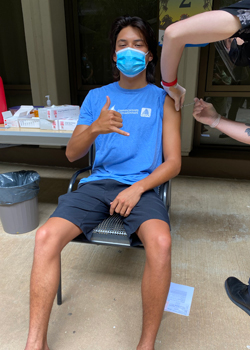
This editorial by UH System Global Health and Social Justice Work Group members Maya Maxym, Jane Uyehara-Lock and Seiji Yamada ran in The Star Advertiser on June 13, 2021.
We are lucky to live in Hawaiʻi, with the lowest COVID fatality rate among the 50 states (35 deaths per 100,000 population). Thanks to safe and effective vaccines, we have seen an approximately tenfold drop in daily new cases and deaths in the U.S. since January. It is a testament to how horrible it has been that this feels like good news.
With more than half the U.S. population vaccinated, we hope to avoid any more surges like we have seen over the past year or the one now beginning to ebb in India.
Throughout the world, however, people are suffering. Not only in India, but also in Latin America, Asia and Africa, high numbers of COVID cases and deaths, whether counted or not, are taking a grim toll. With 2 billion shots in arms, the majority in high-income countries, billions more remain at risk.
Mutations in the genetic make-up of the virus occur when it replicates, leading to new variants. They are still SARS-CoV2 viruses, but they behave differently. The World Health Organization has declared a number to be “variants of concern,” either more transmissible or more lethal than the original, or able to infect those with some immunity.
The more infectious Alpha (B.1.1.7) variant, identified in the United Kingdom, is now the most common variant in the U.S., including here in Hawaiʻi. The Delta (B.1.617) variant, identified in India, is even more infective than Alpha. It may be more lethal. As transmission continues unchecked, these variants will spread. Delta is already dominant in the UK. Additionally, the more transmission occurs, the more new variants can arise.
It appears that vaccines will provide protection against Delta. In countries where fewer than 10% of adults are vaccinated, however, these variants may lead to more catastrophes. Barely 2% of the people in all of Africa and less than 5% of the population of the Philippines have been immunized.
To stave off more disasters, we must support an accelerating, global COVID immunization campaign. The Biden administration’s decision to support the suspension of intellectual property rights for vaccine manufacturing was a step in the right direction, but this will not bring results quickly.
The U.S. has announced that 80 million doses will be donated internationally during June, diverting some surplus vaccine. On June 9, the U.S. also announced that it will purchase and donate 500 million doses of the Pfizer-BioNTech vaccine.
More must be done to cooperate internationally to manufacture and distribute more vaccines, as well as enable production at more factories globally.
However, this takes time, and delays translate to more lives lost and more grieving families. The bottom line is that vaccine access needs to be a global effort. We must hasten to provide vaccines to the rest of our world now, not in six months or a year, and we must support adequate funding for cold chain storage and efficient, equitable distribution where the need is greatest. Although our world seems large, in reality, we all share one planet.
Viruses do not respect borders. For any who might think that we should not prioritize people living abroad—we remind you that the best bet for protecting ourselves is to provide vaccines to all. When transmission slows and eventually stops, we all benefit.
It is time to take action. The University of Hawaiʻi System Global Health and Social Justice Work Group urges the global community to prioritize getting vaccines into arms everywhere as fast as possible. Contact your political leaders. Ask them to support efforts toward providing vaccines to our fellow humans in need by whatever means necessary. You and your loved ones will benefit in the long run.

